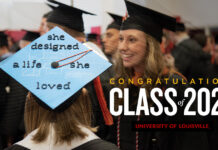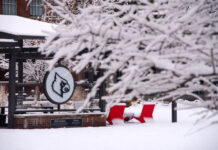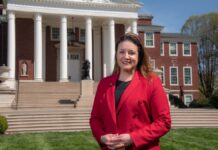
Interim president Dr. Greg Postel hosted a panel discussion on the Belknap Campus Tuesday, inviting the university community to provide input into the future direction of UofL. He said the forum is the first of many similar events that will be held throughout the year as part of a “listening tour.”
“It’s important we have an active dialogue to make sure we are understanding what it is we want for this university going forward,” he said.
Postel opened the forum with an introduction of a new social media campaign, #WeAreUofL, launched last week in the midst of the news about an active FBI investigation into the men’s basketball program.
“What this means is this is our university. We are tough. We are resilient. We’ve gotten through all types of problems and we’ll get through these,” he said.
Updates on SACS and athletics
Prior to introducing the panel of UofL leaders, Postel provided updates on the SACS accreditation process and the latest news from athletics. Last week, SACS sent six visitors to campus to gauge UofL’s progress in addressing the organization’s concerns that initiated probationary accreditation status last year. Specifically, SACS representatives were looking at 10 issues and UofL was cleared on eight of them.
The two that remain a concern have to do with the university’s affiliated entities and the qualification of administrators.
Postel said a memorandum of understanding is being created to define UofL’s relationship with the UofL Real Estate Foundation and the Pediatric Medical Office Building to close the first loop. He added that many searches are underway for administrative positions and he hopes to name a few permanent positions soon to help with the second concern.
More information about the SACS visit is available here.
On the athletics side, Postel said the “bombshell” news about the FBI investigation has consumed a lot of time and he is very concerned about how it is going to play out.
“I’m not going to downplay this. I love this place and it makes me sick that we have to continue to dodge things that hurt our reputation like this,” Postel said. “There is a lot that we still don’t know. It is an ongoing criminal investigation.”
Postel added that he is working to make the best decisions to protect the university and its reputation and that these decisions are not being made in a vacuum.
“There are no personal issues here. I am having many thoughtful conversations with the boards and we are approaching these issues as a team to acknowledge what is necessary to protect the University of Louisville,” he said.
2020 Plan
Postel then pivoted to the panel, brought together to examine UofL’s progress and discuss ideas for the future related to the five pillars in the 2020 plan.
- Educational excellence: Interim Provost Dale Billingsley led the conversation on educational excellence, soliciting ideas on how to best increase enrollment while simultaneously increasing our graduation rate.
Professor Al Futrell suggested using distance education as a strategy to do both: “Distance education has played a major role in helping us get to where we are now. We need more of a focus on it as a legitimate strategy,” he said.
It was also suggested to increase a focus on our international student program. The graduation rates of international students are higher and “if we provide them with a good undergraduate experience, they may be more likely to choose UofL for their graduate studies.”
A concern was raised about who is going to teach all of these extra students if we hit ambitious enrollment goals in the next few years, since faculty resources are already compromised.
A suggestion was made to create a committee to focus on innovative ways to retain and develop adjunct faculty, since about 70 percent of classes are taught by adjuncts.
- Research, scholarship and creative activity: Bill Pierce, EVP for Research and Innovation, noted the dramatic increase in research output from 1997 through 2007-08 and said if UofL would like to continue in the top tier of research institutions, a business plan needs to be devised. He added that the IPR site is a major opportunity for the university.
“Most research institutions in metropolitan areas would kill to have 40 acres of land contiguous to their engineering school,” he said.
It was also suggested that the university focus more on undergraduate research as much as graduate research. This would overlap other priorities, such as educational excellence and recruitment of faculty.
- Diversity, opportunity and social justice: Mordean Archer-Taylor, vice provost for diversity, said there is a compelling interest in diversity, as it intertwines with all of the pillars. Also, a diversity plan has been approved by the CPE and the board of trustees and will be online soon. She noted it is a live document and is focused on the diversity of students and our workforce, as well as cultural competency programs.
- Community engagement: Ralph Fitzpatrick, interim VP of community engagement, noted that UofL is a national leader in community engagement. His goal is to become a national model. He provided a brief overview of some of successes in this area, including the Brandeis Human Rights Advocacy Program, which was recently named as an exemplary designee by the Engagement Scholarship Consortium and the Association of Public and Land-grant Universities as an outstanding model of community engagement. Fitzpatrick also said UofL is in the midst of helping with the major revitalization of the Russel neighborhood in West Louisville, and is heavily involved in health care projects, especially for indigent communities.
“We are a major player in helping to strengthen regional economies and revitalize neighborhoods. We are a national leader. I believe we can become a national model. We stand ready,” Fitzpatrick said.
- Creative and responsible stewardship: Finally, Bryan Robinson, interim vice president of advancement, said his department is getting back to the basics of accountability and transparency. The team is improving the information flow to donors, including annual reports, and it is communicating more closely with deans and faculty to understand unit priorities and how endowment should be spent. The department created an office of stewardship to fulfill this objective.
Postel concluded the forum with a financial update, noting that UofL finished ahead of budget for 2016-17, and is on budget for 2017-18.
“We are just scratching the surface today,” Postel said. “We will continue to obtain input and spend time and consideration to decide what makes sense and find resources to make it possible.”






























